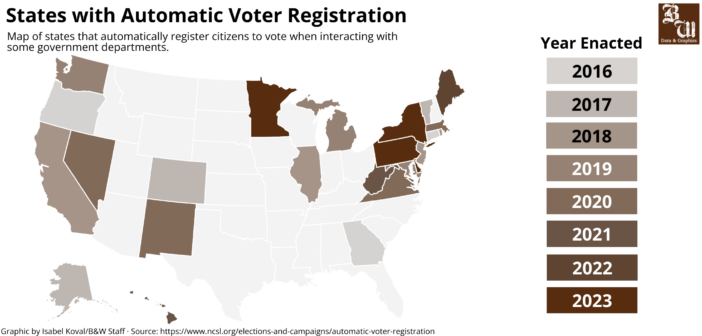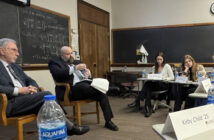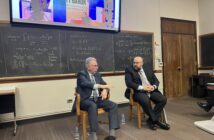Pennsylvania is now the 24th state in the country to implement automatic voter registration, meaning Pennsylvanian residents who have driver’s licenses and ID cards will be automatically registered as voters.
Gov. Josh Shapiro announced the enactment of the policy last month, which aims to make voter registration more streamlined and accessible to ultimately increase voter turnout.
Dylan McFarland, ‘25, a co-chair of civic engagement for the Student Political Action Coalition at Lehigh, said while he is in favor of automatic voter registration, it does not fix the issue of a lack of voter attendance.
McFarland said there are obstructions to voting, including the location of voting centers and lower-class residents’ inability to miss work to vote.
He said voter turnout will rise only if these roadblocks vanish.
Michael Colón, Bethlehem City Council president, said with this new implementation, voter turnout will fluctuate based on how well the policy is communicated to the public. He said that the policy gives more people the opportunity to be registered and participate.
With less than a month until the nation’s next big election day, Colón said his goal is to make sure the public is informed and casts their ballots.
“Anytime we are making voting easier and more accessible, that’s a positive outcome,” Colón said.
He said keeping the public informed has been a challenge. He believes Bethlehem has to work on communicating to the community about changes in voting policies.
Colón said Bethlehem has expanded polling places over the past couple of years to increase voter participation and show people the value of their vote.
“It’s about…(making) sure that people know that collectively — as an elector, city and school district — that we can go out and impact outcomes together in mass at our polling places,” Colón said.
Brian Fife, the political science department chair, said he believes voter turnout will increase in 2024 because states are making voting easier through mail-in ballots.
“I value a higher voter turnout as a healthier democracy,” Fife said.
This new implementation is skewed toward blue states, Fife said, but voting accessibility should not be a partisan issue.
He said he believes the new policy will help citizens who traditionally haven’t voted much by giving them greater access.
Despite Pennsylvania and other states’ efforts to increase voter turnout, Fife said voter restriction has only gotten worse in the last 15 years.
He said some state legislatures have passed laws that make voting less accessible, including purging registration lists and canceling voter registrations.
According to the White House’s Council of Economic Advisers, since January of 2021, 18 states have implemented over 30 different laws that analysts believe will make voting more difficult. Vote-by-mail ballot restrictions were enacted to combat the risk of voter fraud.
Connie Santos, the regional organizing director of the New Pennsylvania Project Education Fund, said the organization has made progress with registering students this year.
According to the New Pennsylvania Project, the non-partisan organization is led by community leaders across the commonwealth dedicated to connecting underrepresented and underserved individuals to embrace their power through voting.
Santos said the organization helped 400 students in 2022 and 420 students register to vote across Pennsylvania so far this year.
McFarland said the main goals of Lehigh’s Student Political Action Coalition are to inspire civic action on all types of social issues and to also increase voting turnout around campus and in Bethlehem during election season.
With automatic voter registration now implemented in Pennsylvania, the club’s approach has shifted.
“So now, my job is going to be asking random people, ‘Hey, are you going to vote?’,’”McFarland said. “(Automatic voter registration) is a step in the right direction, but it is hard and requires a lot of people to inspire that desire to vote.”
Just five years ago, Lehigh University began Civic Engagement Day, which gives students and faculty the day off on election day each year. McFarland expressed how beneficial this day off is for Lehigh’s students and faculty who were previously unable to vote on voting day due to classes.
“We’re privileged in that our mission is now trying to make voting fun and engaging and meaningful, rather than getting people to vote at all,” McFarland stated. “We’re certainly thankful for all the action taken by Lehigh’s (administration) and other organizations, but the fight isn’t over until everyone can vote, has a genuine and meaningful desire to vote, and does so while being informed and empowered to make their own opinion heard.”






Comment policy
Comments posted to The Brown and White website are reviewed by a moderator before being approved. Incendiary speech or harassing language, including comments targeted at individuals, may be deemed unacceptable and not published. Spam and other soliciting will also be declined.
The Brown and White also reserves the right to not publish entirely anonymous comments.
1 Comment
“McFarland said there are obstructions to voting, including the location of voting centers and lower-class residents’ inability to miss work to vote.”
Making some election days paid holidays doesn’t seem to be gather much interest. Is it because not many want another paid holiday, not many want to remove another holiday or many fear the day off will not be used for voting. Previous B&W coverage indicates to me that the Lehigh community would strongly support making at least some election days holidays.